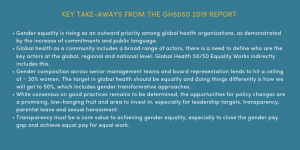From the Global Health 50/50 2019 report to 50/50: take-aways and next steps
A wealth of new data on gender equality, published in the new Global Health 50/50 Report, is challenging organizations working in global health to reflect seriously on their gender-related policies and practices. One month on from International Women’s Day and the report’s launch, Dr. Roopa Dhatt, Executive Director and Co-Founder of Women in Global Health, offers her reflections on the report and three areas for action.
Global Health 50/50’s 2019 report ‘Equality Works’ provides an unparalleled dataset on organizational performance on gender, highlights progress and pitfalls and puts forward an agenda for change. The report outlines tangible, concrete steps to advancing institutional progress on gender parity in leadership, work-life balance, eliminating the gender pay gap and the prevention of sexual harassment. In reviewing the report and reflecting on the response to the recently published literature review: Delivered by Women, Led by Men: A gender and equity analysis of the global and social workforce, co-produced by WHO and WGH, I found three messages in particular worth highlighting.
Firstly, among the most important lessons of the past few years is that to advance gender-transformative change we must better communicate that gender equality is everyone’s business. Greater equity and diversity must be at the very core of our leadership practices and the global health community must do better to root out all forms of discrimination, bias, and inequities that result in us missing out on human capital. This demands not only that organizations have gold-standard policies but that they implement and practice them in full. A clear first step is to ensure that organizational leadership is gender-balanced and that senior management themselves foster inclusive gender norms. Change must occur at all levels of society and organizations can do their part by fostering this gender transformative leadership.
Secondly, we need to hold organizations to account for gender equality outcomes. It should be the ultimate goal of the 21st century, to ensure all people, regardless of gender, can achieve their maximum potential. Equality Works offers an essential first step towards reaching this goal by analyzing the policies of 198 organizations in global health and in doing so sets the foundation for greater, more accountable organizations. As the report shows, organizations and the individuals that work for those organizations have a responsibility to advance social change through their values, policy and programs.
Thirdly, talented women exist in all settings. The reason they are not leading at top influential levels is deeply rooted in power, privilege and sociocultural drivers that allow inequity to thrive, instead of people. It is our responsibility to set the standard high, transform power relations, such that all people regardless of sex, gender, race, ability, caste, religion and socioeconomic status can thrive in their lives and reach leadership at every level. Without this, we are holding back the potential of half the world’s population and collectively missing out as a result.
The Global Health 50/50 Report is a refreshing piece of work which pushes the global health community to think beyond individual and interpersonal barriers to gender equality. The report takes the conversation beyond fixing women to fixing systems. A cultural shift is happening in global health and if the global health community seriously reflects and takes action on this data, it could be a launch pad for social change in global health and beyond. At Women in Global Health, we advocate for such an approach to gender equality, as we know the barriers can be found at all levels and greater investment is needed to push for institutional change. My hope is that organizations take these findings and use them to spur change over the coming year. To make this happen, I believe we need to collectively undertake three actions:
- Disseminate the report along with a specific toolkit outlining how to use the report for social change in organizations, particularly by targeting decision-makers, policy communities and activists.
- Link the Global Health 50/50 dataset with global repositories of gender data and open source data so that the data can be used and disaggregated to the national level.
- Add a dimension of social accountability, using a partnership model, to capture greater quantitative and qualitative data – case studies of organizational change would be particularly useful for illustrating that organisations around the world are taking action and seeing the benefits of gender equality.
-Dr. Roopa Dhatt
Women in Global Health, Executive Director and Co-Founder
For more of my key take-aways see below:



